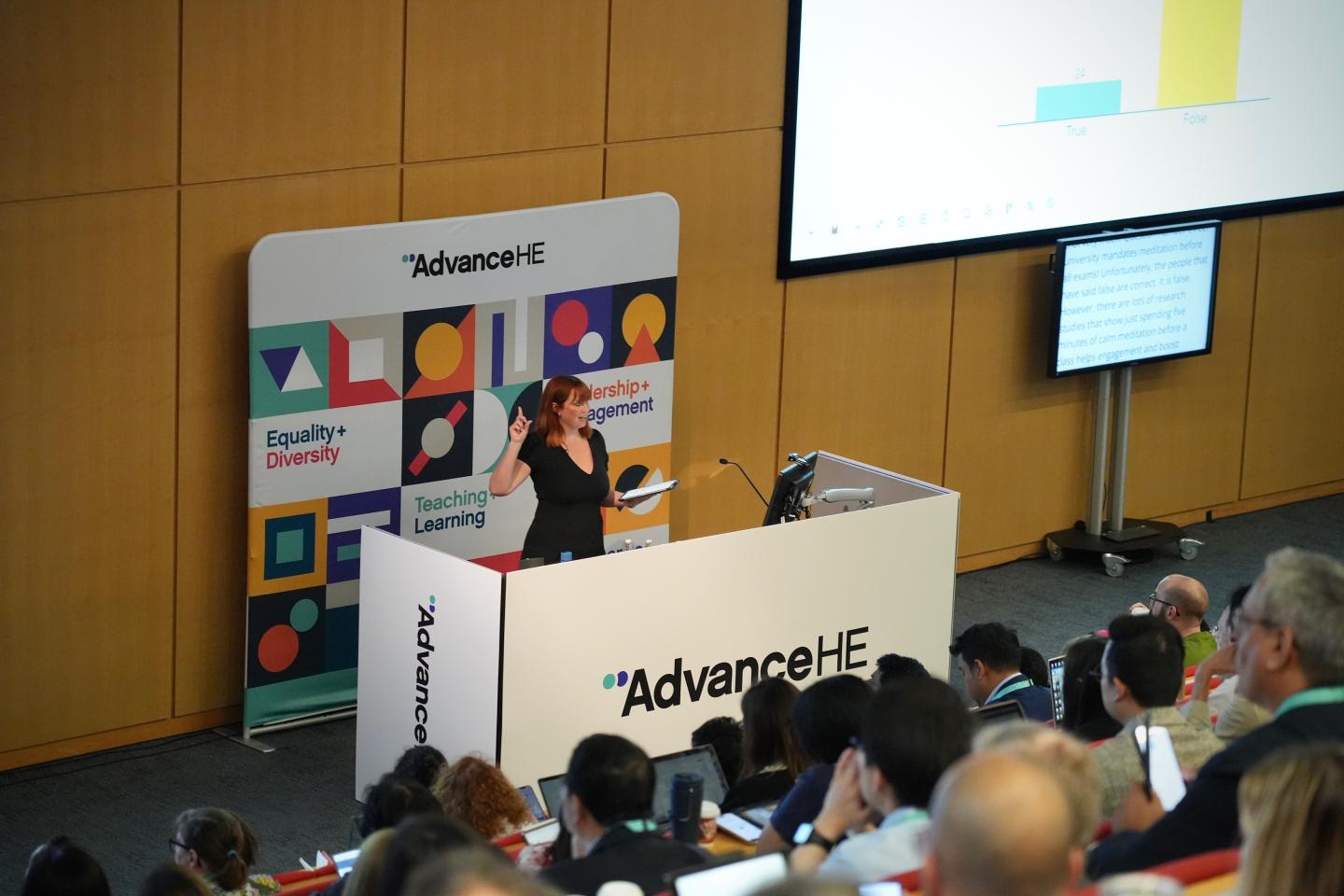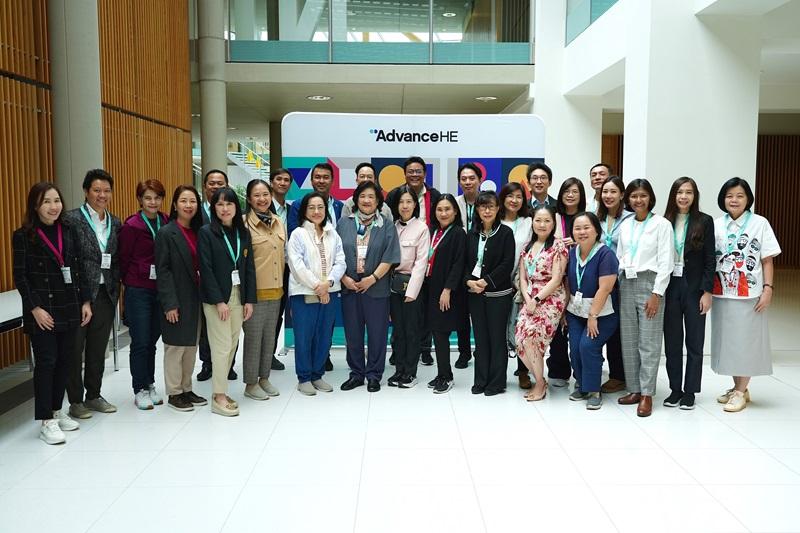More than 300 practitioners involved in all aspects of higher education teaching and learning from the UK and overseas gathered at Nottingham Trent University for the first day of Advance HE’s flagship Teaching and Learning Conference 2024.
The Conference, spread over three days, is expected to welcome 650 delegates to explore future-focused education and consider innovation, inclusion and impact.
Opening day one, Dr Charles Knight, Assistant Director Knowledge and Innovation at Advance HE, said,
“This conference demonstrates the power of higher education when we come together to exchange ideas and develop best practices but also refresh our shared belief in what we do and the difference we collectively make.
“We know that higher education will continue to provide a transformational experience for its students. Advance HE stands ready to support you in doing so. Whatever change the future brings, I know that we are ready to adapt to those circumstances.”
Jane McNeil, Pro Vice-Chancellor Director of Education at Nottingham Trent University (NTU), welcomed delegates to NTU’s City Campus. She said,
“It is great that so many educational professionals are here to learn and inspire one another. This particular conference holds a special place in my heart; I’ve attended so many in the past, so it is personally thrilling to me that this conference has come to NTU.
“I presented [at conference] a few times talking about developing writing and belonging in history. If it is your first time presenting here, if you’re sitting here feeling a little nervous about your session – I can relate! All I can say is, you will be magnificent. I always found the delegates at this conference so supportive, friendly and open to new ideas. You will triumph!
“Advance HE has an unwavering commitment to professionalism in higher education. We really value the work of Advance HE. We value that you give us this conference year after year. It is such a great opportunity for sustained ideas and scholarship.”
Keynote
Keynote speaker Professor Sarah Jones, Pro Vice-Chancellor Academic Enhancement and Research, and Professor of Education Innovation, University of Gloucestershire, is committed to the transformation of higher education through pedagogy, technology and future practice. She presented ‘three models for the future university’, encouraging the audience to vote on the preferred option.

She said, “I am unapologetically all about the student. I have this relentless commitment to ensuring excellence in the experience for ALL of our students, ensuring things like equitable opportunities, inclusivity to their teaching and learning, and the curiosity, the criticality, the collaboration. These are really important to ensure great outcomes for all of our students.
“I believe in the fundamental purpose for higher education which is transformation. Now, my plan for today is really to think about three new models, and the underlying pedagogy that we need. It may be a little bit provocative, it may cause you to rethink, but what I want to do is really to kick-start serious change as we cannot wait any longer.
Conglomerates
“Option number one is the conglomerates. Imagine a world where the boundaries between universities blur.
"In this model, universities can combine, maybe form their own super university. Maybe it has an executive lead, something like the academy structure in schools where they come together, and you have that Super Head. Or maybe it's a shared model to provide core services, like IT, libraries, HR.
"What is really interesting about the conglomerate model is that it is not just for those resources but our students as well. They would have the freedom to take modules from any university within that group, crafting this personalised and interdisciplinary education. It is a step up from things like credit-sharing and credit transfer, which can be an administrative burden. It does rely, however, on a single-credit framework. But this model opens up all those opportunities for personalisation, and opportunities for resource-sharing, not just for those core services. It can also share things like faculty expertise, research facilities, bringing those networks together for research grants.
"Research for technology, optimising the use of assets, and really the overall quality of education. Students would be able to tailor their own education to their own unique needs and aspirations, and it really creates that diversity of thought. It opens up a much wider pool, wider exposure to different teaching styles, and different academic cultures enriching the learning experience.”
Academic vs. vocational
“The second model is dividing the sector explicitly into academic institutions or vocational universities. We are used to there being this divide when we talk, and in the press. This second model puts an end to this and places universities in different categories of equal value. Those two words are really critical here. It is of equal value. You have those that are focused on academic research and scholarship, and those towards more vocational training. This model aims to address the diverse need of students and the job market.
“In those academic research institutions they're prioritising theoretical research, the advancement of knowledge, hubs for intellectual exploration and critical thinking. In the vocational universities, it's much more focused on those practical skills and that industry research.
"No one model is better than the other. They're different in nature and we just need to accept that they are different in nature.
“There must be an equity of funding and an acceptance of the fact that industry-defining research is as valid as more theoretical academic research and both have a strong place in the sector.”
The co-operative
“The third model is the co-operative university where students, staff and stakeholders invest in, and manage, the institution. This model emphasises democratic governance and shared responsibility.
“The Co-operative University sees all as true partners. They have voting rights for how it is run, voting rights for what courses are delivered, and how they are delivered, and the direction that the university is taking.
“It is clear to see how that does have real benefit, an academic community of all parts coming together where there is more engagement and stakeholders are directly involved in governance. Students feel that sense of empowerment, ownership, and responsibility, and are more motivated as a result.”
Designing courses for the future
“We don't know what jobs students are going to go into. We all accept that. We accept that the sectors are changing. We accept that we don't know what might be happening in 10 years, so why are we still delivering courses designed for a specific job?
“Instead, I think there are three curriculum essentials that we really need to be aware of. Defining artificial intelligence, skills 4.0, and future literacies.
Defining AI
“So much of AI is about how it is being done to us - how are students using it? What about plagiarism? We need to educate better. We need to use more inclusive assessments because of Al. And we are really missing the point.
“We need to be thinking about the application in those sectors of Al, not Al for learning. That is important. But that is not what is critical. We need to think about how a student going into various sectors will be using Al in their work, how is it being used in architecture? How can we define it better? How can we be in control of how it is being used? Diagnostic tools in healthcare - what is next? Our students need to be thinking about that, and we need to be thinking about that and developing the literacies around it so our students can use it. We need to think about it in the future so we are defining it.
Skills 4.0
"Skills Development Scotland came up with Skills 4.0, and it is something that is important to me when I talk about those key transferrable skills. We really need to fully embed it in what we are doing, because it is those skills that students will need to progress to good outcomes. It is about curiosity and creativity. It is about collaboration, it is about integrity. It's about using the initiative, so this framework, the Skills Development Scotland came up with is something that we really need to be thinking about.
Future literacies
“I like the idea that students are coming out of university with a mindset that is future-focused. It really helps to shape policies and systems, understanding resilience, and how we bounce back from that. It is those core skills that we need to be embedding within our students. Future literacies is great for universities because we are helping our students to thrive into those jobs that they don't yet know what they are.
“We can't just sit back and wait for change to be able to happen. We have to change it ourselves. If we cannot change the funding model right now, which we could be waiting for years to change, to be useful, we have to work within those parameters, and make that change, because we all know we have to.
Responsibility for teaching
“We also need to take responsibility for what we are teaching. When we openly say that we don't know what jobs students are going into, yet we sell them a particular career, that is not right.
“We have to ensure that what we are teaching is preparing the student, whether that is future literacy, digital literacy, or looking at Al, and it is our responsibility to do that for our students. And we can do it. If you look around everybody in this room, we have the best minds in teaching and learning in this room right now, thanks to Advance HE, and that is pretty cool. For a pedagogue like myself, I think this is an amazing environment. If we've got all these minds right here, the excellence in teaching and learning, we can make that change. We have all of this expertise, and we just need to do it. And we can, and then the university sector will transform into something great.”
Focus on teaching in Thailand

Twenty-seven members of staff from Srinakharinwirot University in Thailand joined conference delegates as part of a trip to exchange approaches on contemporary teaching.
Srinakharinwirot University (SWU) is a comprehensive, research-intensive university based in central Bangkok that has put a strong focus on the quality of its teaching. In collaboration with Advance HE, it has now recognised over 400 of its staff as Advance HE Fellows and recently achieved a 5* ranking by QS for Academic Development.
Thank you @VirtualSarahJ for your excellent interactive opening keynote @AdvanceHE Teaching and Learning conference on future models for higher education and importance of supporting students to develop skills they need for a digital workplace pic.twitter.com/DnPRg8P9aP
— sarahknight #FE #HE (@sarahknight) July 2, 2024
A privilege to deliver the opening keynote at @AdvanceHE #TLConf #tlconf24 in my new role at @SolentUni. It was time to present three options for future HE models, accepting we cannot wait to change.
— Professor Sarah Jones (@VirtualSarahJ) July 2, 2024
Thanks to @NottmTrentUni for hosting pic.twitter.com/xd2XenWNh7
Enjoyed @profmarjory opening comments. i) I love @advancehe conference. ii) AI is everywhere &I was working with it before it became fashionable. Can't wait to hear more about what we can learn from her research. Already challenged to consider if we should call it AI? #tlconf24
— William Carey (@wcarey) July 2, 2024
Let the 3 days begin! Looking forward to geeking it up on all things #teachingandlearning @AdvanceHE #TLconf24 presenting on #AI and #digitalskills @Hartpury pic.twitter.com/4GPmNgDJ8U
— Kate Wilkinson (@KateWilkinson19) July 2, 2024
Discover the 2024-25 Programmes and Events portfolio
Our new portfolio for 2024-25 blends high-quality learning and insight-sharing opportunities delivered using a range of innovative techniques and platforms both in person and virtually. There is a 5% early booking discount for bookings made before 30 September 2024 on this service. This is in addition to a 25% discount if your organisation is an Advance HE member.